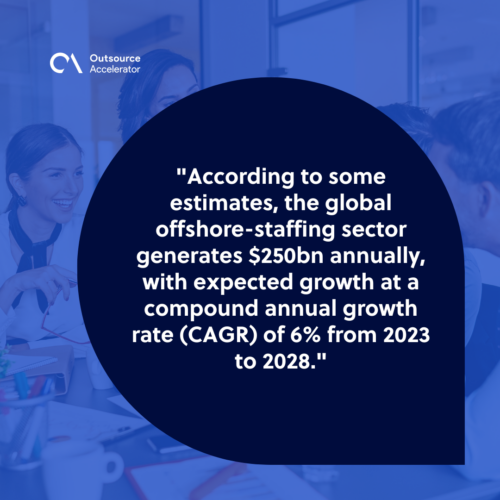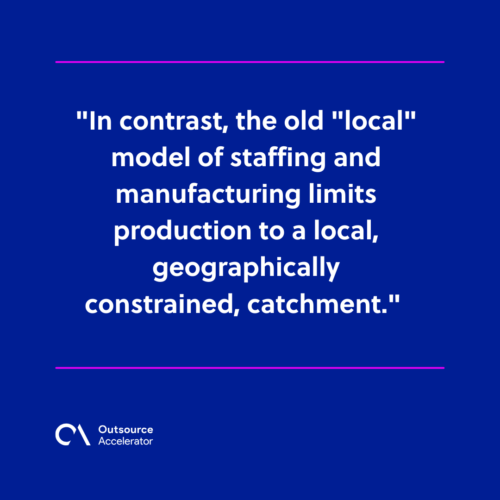Easter is over, and we are now well into Q2. The year is zipping by. Next stop, summer! Before you hit the beach though, let’s get down to the business of business. We’re working hard to bring you the best strategies to move your business forward.
The hypocrisy of global trade vs. global staff
I would argue that offshore manufacturing, and offshore staffing, are almost identical in nature. They both offer offshore production – either of products or services. However, the two are often treated as vastly different in public discourse and policy.
Offshore manufacturing is now entirely and inextricably entrenched in our society. It is common for people to use Korean computers, drive German cars, wear European clothing, drink Colombian coffee, and eat food sourced from everywhere but home.
Companies have long sought to relocate production facilities to countries with lower labor costs, more favorable regulatory environments, and other advantages that can help them reduce costs and improve competitiveness.
According to a report by the United Nations Conference on Trade and Development (UNCTAD), developing countries accounted for over 60% of global merchandise exports in 2019. The same report found that the worldwide trade of manufactured goods has increased from around 20% of total trade in the early 1970s to about 70% today.
Manufacturing offshore is now considered the default. Some may not like it, but it is now the norm. And an unavoidable one at that.
The new staffing paradigm
In contrast, offshore staffing is a newer phenomenon that has emerged more recently as a way for companies to tap into a global pool of talent for tasks such as software development, customer service, and administrative work. Unlike offshore manufacturing, offshore staffing involves relocating services rather than physical production facilities. This makes it more visible and potentially more controversial, as it raises questions about the distribution of jobs and economic benefits across borders.
According to some estimates, the global offshore-staffing sector generates $250bn annually, with expected growth at a compound annual growth rate (CAGR) of 6% from 2023 to 2028.

Offshore staffing is only a recent possibility. High-speed internet means that anyone anywhere can work for any company anywhere. The movement of human labor and migration of people has always been strictly controlled by conventions such as governments, countries, quotas, and borders. Now, with technology providing a workaround, people are creating a global workforce.
The global pool of talent is strikingly similar to the omnipresent global manufacturing model, which is now many decades old.
Offshore manufacturing is often seen as less controversial than offshore staffing because it is perceived as being more closely tied to the physical production of goods. While there may be concerns about labor conditions and environmental impacts associated with offshore manufacturing, these tend to be framed in terms of broader economic and social issues rather than as specific objections to the practice of outsourcing production to other countries.
The new entrant gets in trouble
In contrast, offshore staffing can be seen as a direct threat to domestic jobs and wages, particularly in sectors such as IT and customer service, where offshore staffing is most common. This has led to more vocal opposition to offshore staffing, particularly from labor unions and other groups that are concerned about the impact of outsourcing on domestic employment.
On closer inspection, the two offshoring models are actually more similar than they are different. Basically, both models utilize a global supply chain to ‘get stuff done,’ with cost and quality as the primary parameters. In contrast, the old “local” model of staffing and manufacturing limits production to a local, geographically constrained, catchment.

It is easy to see the stark difference in adoption and acceptance of the two. It is fair to say that 100% of companies use overseas manufactured products in their business – furniture, materials, machines, laptops and printers. Yet, very few businesses use overseas-based production staff.
The question for your business
Do you consider offshore manufactured products different from offshore-professional staff?

 Independent
Independent





















